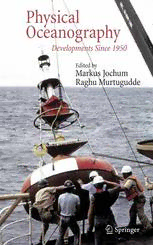
Physical Oceanography: Developments Since 1950 PDF
Preview Physical Oceanography: Developments Since 1950
Physical Oceanography Developments Since 1950 Physical Oceanography Developments Since 1950 Editedby Markus Jochum NationalCenterforAtmosphericResearch Boulder,Colorado,USA and Raghu Murtugudde UniversityofMaryland CollegePark,Maryland,USA MarkusJochum RaghuMurtugudde NationalCenterforAtmosphericResearch ESSIC/UMD OceanographySection CSSBldg/Room2201 1850TableMesaDrive,Room415 CollegePark,MD20742 Boulder,CO80307-3200 USA USA [email protected] [email protected] CoverphotographcourtesyofAndrewShepherdNOAA/PMEL. LibraryofCongressControlNumber:2005935458 ISBN10:0-387-30261-1 ISBN13:978-0387-30261-4 (cid:1)C 2006SpringerScience+BusinessMedia,Inc. Allrightsreserved.Thisworkmaynotbetranslatedorcopiedinwholeorinpartwithoutthewrittenper- missionofthepublisher(SpringerScience+BusinessMedia,Inc.,233SpringStreet,NewYork,NY10013, USA),exceptforbriefexcerptsinconnectionwithreviewsorscholarlyanalysis.Useinconnectionwith anyformofinformationstorageandretrieval,electronicadaptation,computersoftware,orbysimilaror dissimilarmethodologynowknownorhereafterdevelopedisforbidden. Theuseinthispublicationoftradenames,trademarks,servicemarks,andsimilarterms,eveniftheyare notidentifiedassuch,isnottobetakenasanexpressionofopinionastowhetherornottheyaresubject toproprietaryrights. PrintedintheUnitedStatesofAmerica. (BS/DH) 9 8 7 6 5 4 3 2 1 springer.com Truth is a pathless land Krishnamurti Contributors FrancisBrethertonreceivedhisPh.D.inAppliedMathematicsfromtheUniversityof Cambridgein1961andiscurrentlyProfessorEmeritusattheUniversityofWisconsin. KirkBryanreceivedhisPh.D.inMeteorologyfromtheMassachusettsInstituteof Technologyin1958andiscurrentlySeniorResearchScholaratPrincetonUniversity. Russ E. Davis received his Ph.D. in Chemical Engineering from Stanford Univer- sity in 1967 and is currently Research Oceanographer at the Scripps Institution of Oceanography. J.S.GodfreyreceivedhisPh.D.inPhysicsfromYaleUniversityin1968andisnow retiredinTasmania. MichaelJ.McPhadenreceivedhisPh.D.inPhysicalOceanographyfromtheScripps Institution of Oceanography in 1980 and is currently Senior Research Scientist at NOAA’sPacificMarineEnvironmentalLaboratory. Dennis Wilson Moore received his Ph.D. in Applied Mathematics from Harvard Universityin1968andiscurrentlyLeaderoftheOceanClimateResearchDivision atNOAA’sPacificMarineEnvironmentalLaboratory. Walter Munk received his Ph.D. in Oceanography from the Scripps Institution of Oceanographyin1947andholdstheSecretaryoftheNavyChairinOceanography. JosephPedloskyreceivedhisPh.D.inMeteorologyfromtheMassachusettsInstitute ofTechnologyin1963andiscurrentlySeniorScientistattheWoodsHoleOceano- graphicInstitution. S.GeorgePhilanderreceivedhisPh.D.inAppliedMathematicsfromHarvardUni- versityin1969andiscurrentlyProfessoratPrincetonUniversity. vii viii Contributors JosephL.ReidreceivedhisM.Sc.inPhysicalOceanographyfromtheUniversityof California(LosAngeles)in1951andiscurrentlyProfessorEmeritusattheScripps InstitutionofOceanography. Bruce A. Warren received his Ph.D. in Physical Oceanography from the Mas- sachusetts Institute of Technology in 1962 and is currently Scientist Emeritus at theWoodsHoleOceanographicInstitution. CarlWunschreceivedhisPh.D.inGeophysicsfromtheMassachusettsInstituteof Technologyin1966andiscurrentlyaProfessorthere. KlausWyrtkireceivedhisPh.D.fromtheUniversityofKielin1950andiscurrently ProfessorEmeritusattheUniversityofHawaii. Foreword OverthelastfivedecadesPhysicalOceanographydevelopedexplosivelyfromastate withonlyafewobservationsandtheoriestoamaturesciencewithglobalfieldpro- grams,massivecomputerpower,andacomplextheoreticalframework.Thescientists wholedthisdevelopmentarealreadyorwillsoonberetired.Thiscollectionofessays documentssomeofthebreakthroughsandalsotriestocapturethespiritofexploration andexcitementthataccompaniedthesedevelopments. Theoriginalmotivationforthepresentbookcamefromourdesiretounderstand thecurrentsocialandscientificframeworkinwhichweworkasphysicaloceanog- raphers. Brief reflection makes it obvious that this framework must have historical roots. However, discussions about these roots with senior scientists only made the picture more complex and confusing. We came to the conclusion that there is no simplestorythatexplainsthecurrentstateofaffairs.Thenaturalsolutionwastolet seniorscientiststellhowtheyperceivedthedevelopmentsinthefield,eachfromtheir ownuniquepointofview.Thus,bysurrenderingeditorialobjectivitywearrivedat abroader,moreobjectiveview.Theapproachiscomparabletodataacquisition:itis knownthattherearenoperfectobservations,soonemakesmany. Thegoalthenistoreducebiasesbysamplingasoftenaspossible.However,to keepthebookatamanageablesizeandstillgivetheindividualauthorsspaceenough to cover several decades, we were limited to 10 to 20 authors whose contributions should not exceed 20 pages. Thus, the book is by no means a complete history of physicaloceanography;manyimportantscientistsandsubdisciplinesofthefieldare notaccountedfor.Still,wetriedtoprovideacoherentyetvariedauthorbasethatis geographicallydiverseandevenlydistributedamongthefollowing(ratherartificial) categories:modelling,observationsandtheory.Wedidnotsolicitcontributionsfrom closecolleagues.Twentyseniorscientistswereaskedtocontribute,13did;5declined becausetheydidnothavesufficienttimeand2didnotthinktheprojecttobeagood idea in the first place. Unfortunately, there is a geographical bias in the latter two groups,renderingtheauthorshipbiasedtowardstheUnitedStates. ix x Foreword Fromthebeginningoftheprojecteveryauthorknewthecompletelistofau- thors.Theauthorswereencouragedtowritepersonalviewsofthehistoryofphysical oceanography, the exception being Bruce Warren to whom we are indebted for the historicalintroduction.Inlinewiththeideaofabandoningobjectivity,therewasno formalreviewprocess.Thismakesthesuccessofthisbookrelyonthemoralintegrity of the authors, and we believe that each author made an effort to be subjective yet fair.Thefunctionoftheeditorswaslargelyrestrictedtoaskingforclarificationsin thesubmittedmanuscripts. Editingthisbookandtherelateddiscussionswithmanyscientistsprovedex- citing and illuminating. It illustrated that science is a social enterprise shaped by a communityofindividualsandtheoccasionalelementofchance.Itmadecleartous that progress relies on communication across the boundaries of disciplines and is madeoverdecades,notmonths.Basedonthefollowingchaptersitappearstousthat twothingsstandoutinthehistoryofphysicaloceanography:largeprograms,which seemtohavethepowertocreateacommunityoutofindividuals,andthepersonof HenryStommel,whoprovidedinspirationtomany. MarkusJochum RaghuMurtugudde Fall,2005 ACKNOWLEDGEMENTS ThisbookwouldnothavebeenwrittenwithouttheinitialencouragementofNelson Hogg, David Kaiser, Joe Pedlosky, and Carl Wunsch. The editors are also grateful to Peter Gent and Bill Large as invaluable sources of historical information and general advice, and to Gustavo Goni for advice on publishing books. The editors were supported by the National Center for Atmospheric Research (M.J.) and the UniversityofMaryland(R.M.). Contents 1. HistoricalIntroduction:OceanographyoftheGeneral CirculationtotheMiddleoftheTwentiethCentury....................... 1 BruceA.Warren 2. ReminiscencesofMODE.......................................................... 15 FrancisBretherton 3. ModelingOceanCirculation:1960–1990,theWeatherBureau, andPrinceton......................................................................... 29 KirkBryan 4. ContributionstoGlobalOceanObservations................................ 45 RussE.Davis 5. OnReconcilingOceanicandAtmosphericEstimatesofSurface HeatFluxes—andonValidatingGreenhouseModels...................... 67 J.S.Godfrey 6. ElNin˜oandOceanObservations:APersonalHistory..................... 79 MichaelJ.McPhaden 7. ReflectionsofanEquatorialOceanographer................................. 101 DennisWilsonMoore 8. OceanAcousticTomography:FromaStormyStarttoan UncertainFuture.................................................................... 119 WalterMunk xi xii Contents 9. AHistoryofThermoclineTheory............................................... 139 JosephPedlosky 10. SextanttoSatellite:TheEducationofaLand-Based Oceanographer..................................................................... 153 S.GeorgePhilander 11. SomeAdvancesandRetreatsintheStudyofOceanCirculation since1935............................................................................ 165 JosephL.Reid 12. TowardstheWorldOceanCirculationExperimentandaBit ofAftermath......................................................................... 181 CarlWunsch 13. InterviewwithKlausWyrtki,25February1999........................... 203 HansvonStorch,Ju¨rgenSu¨ndermann,andLorenzMagaard Index......................................................................................... 239
